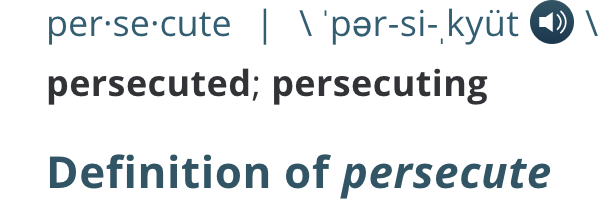What Is Persecution?

It’s been said that persecution is a word we should never use in a North American context. It’s a slap in the face to the persecuted church, a dishonoring of our brothers and sisters abroad who suffer so much for Christ.
On the face of it, this objection seems to have a lot of weight. Believers in China, for instance, face persecution to a degree which most of us in the West can barely comprehend. If you think your sufferings over here are equal to their sufferings, you have absolutely no idea what you are talking about.
The problem with this order-of-magnitude approach, however, is that it is entirely subjective. The persecution faced by North Korean Christians is far more severe than what is faced by our Chinese brethren. Can Chinese Christians speak of persecution amongst themselves without “dishonoring” their North Korean brothers and sisters?
Who gets to decide what persecution really is? Our subjective experiences? The State Department? The United Nations? To answer this question, we must turn to Scripture.
I can’t imagine anyone being a better expert on the subject of persecution than the Apostle Paul. He was formerly a persecutor, and suffered under much persecution during his ministry. He knew persecution intimately from both sides. Writing to the Galatians, being carried along by the Holy Spirit, Paul tells us that Ishmael “persecuted” Isaac (Gal 4:29). Yet in the Old Testament, we read only that Ishmael “mocked” Isaac (Gen 21:9). Was Paul belittling the torture and martyrdom of his fellow believers when he spoke of persecution in that context? Of course not. He understood that persecution comes in many different forms.
Listen carefully to the words of our Lord Jesus:
“Blessed are you when they revile and persecute you, and say all kinds of evil against you falsely for My sake. Rejoice and be exceedingly glad, for great is your reward in heaven, for so they persecuted the prophets who were before you” (Matt 5:11, 12).
Jesus taught that the way in which the prophets had been persecuted included reviling and false accusations. He taught that no one who left all to follow Him would fail to receive “persecutions” in this age (Mark 10:30). Persecution is the experience of every disciple in history, on every continent, in every country. If you are a follower of Christ, you have been—and will be—persecuted.
The inspired pen could not be clearer on this point: “...all who desire to live godly in Christ Jesus will suffer persecution,” (2 Timothy 3:12).
You see, persecution doesn’t always end in beheading. Persecution is merely the opposition you face in the path of obedience, designed to take you out of the path of obedience. Does that mean the sneers of your co-workers are just as bad as John Bunyan’s languishing in prison? Certainly not. Not all persecution is the same.
George Whitefield offers helpful insight here:
“Not that I affirm, all are persecuted in a like degree. No: this would be contrary both to scripture and experience. But though all Christians are not really called to suffer every kind of persecution, yet all Christians are liable thereto: and notwithstanding some may live in more peaceful times of the church than others, yet all Christians, in all ages, will find by their own experience, that, whether they act in a private or public capacity, they must, in some degree or other, suffer persecution.”
When 21 orange-clad Christians were beheaded on a Libyan beach by ISIS militants in 2015, they paid the ultimate price in persecution.
When Charles Spurgeon was slandered by the newspapers of his day, when his motives were maligned, when he was falsely blamed for the stampede that left 7 dead during his preaching one Sunday morning, he was suffering persecution as well.
And you, dear Christian, when your friends call you an out-of-touch dinosaur for not defiling your conscience with certain wicked entertainments, you are tasting a tiny bit of persecution too.
Here’s where it gets glorious: your sympathetic Saviour knows it all! He is intimately connected to the sufferings of His bride (Acts 9:4). The same Jesus who sustained faithful saints in the dungeon a thousand years ago feels how much that little word of accusation hurts you this very instant. In looking to Him, you will find the strength needed to go on in obedience.
Does this mean we need to walk around with a persecution complex? Not at all. If you’re looking to add a persecution merit badge to your Awana vest, you’re missing the point. The posture of every believer ought to be, “We are unprofitable servants. We have done what was our duty to do,” (Luke 17:10).
At the end of the day, whether you are being persecuted or not shouldn’t really matter when determining your course of action. You need only be determined to walk in obedience to Jesus, willing to accept the consequences, whether they be small or great.
This is how you honour the martyrs who have gone before you. This is how you honour the persecuted church today. Most importantly, this is how you show honour to Jesus Christ. He who is worthy of great suffering is worth a little suffering as well.